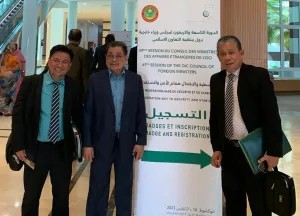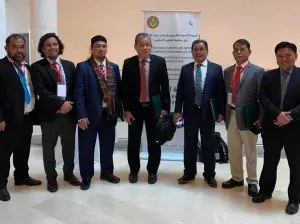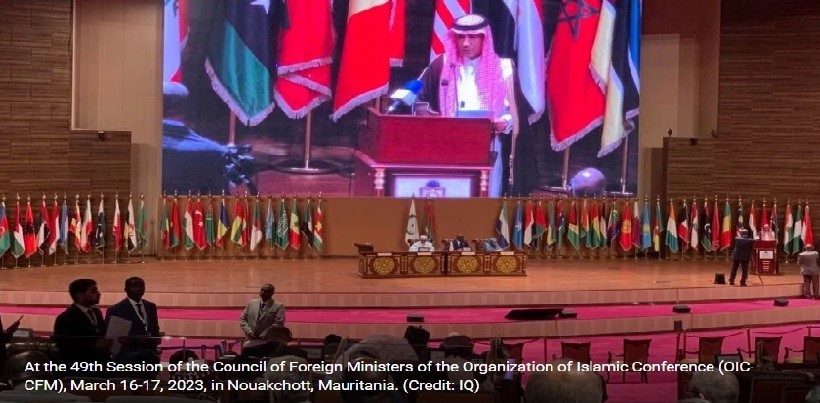March 18, 2023
BCPCH showcases Sama Culture for Cultural Booth Kickoff on Bangsamoro Governance Day
March 18, 2023 / edd1994
Source: https://wp.me/paaccn-rb4
By EDD K. USMAN | Twitter: @edd1819 | Instagram: @bluestar0910 | Facebook: SDN — SciTech and Digital News
MANILA (SDN) — The Organization of Islamic Cooperation (OIC), is not done with the Mindanao peace process.
In fact, the OIC, now headed by Secretary General Hissein Brahim Taha, with 57-member States, continued to provide a forum for the Moro National Liberation Front (MNLF) and the Moro Islamic Liberation Front (MILF), inviting the two groups to attend its Summits (IS) and Conferences. In fact, the MNLF presently is the only Observer in the OIC in the “Organization Category”.
The Islamic Summit held every two years (last time was in 2019 before the pandemic) is attended by Kings, Presidents, and Emirs. On the other hand, the conferences are for the 57 member-States foreign ministers (conducted every year).
On March 16-17, 2023, the pan-Islamic body, which calls itself “The Collective Voice of the Muslim World”, staged its 49th Session of the Council of Foreign Ministers (CFM) in Nouakchott, Mauritania, Northwest Africa.
Officials of the Bangsamoro Autonomous Region in Muslim Mindanao (BARMM), who are either of the MNLF or the MILF attended the conference, with the theme focusing on “Moderation: Key to Security and Stability”, among them, MILF Peace Implementing Panel Chair Mohagher M. Iqbal, who is also a Member of Parliament (MP) and Education minister of BARMM; MP Hatimil Hassan; MP Abdulkarim T. Misuari, son of MNLF Founding Chair Nur P. Misuari; Executive Director Mohajirin Ali, of the Bangsamoro Planning and Development Office (BPDO); Bangsamoro Transition Authority (BTA) Member Denmartin A. Kahalan; and Bangsamoro Commission for the Preservation of Cultural Heritage (BCPCH) Chair Dr. Salem Lingasa, and others.
In every Resolutions of the OIC, which was established by Muslim and Arab countries in September 1969 following a Jewish extremist’s attack on the Al-Aqsa Mosque (third holiest shrine in Islam), has been following up since the mid-1970s what it dubbed the “Question of Muslims in Southern Philippines”, chiefly because of the struggle of Muslim Filipinos for self-determination and achieve equality with their fellow Filipinos.
OIC Leaders of MNLF & MILF to Strengthen Their Coordination and Cooperation
The OIC, with Headquarters in Jeddah, Kingdom of Saudi Arabia, has a department that focuses on Muslim communities and Muslim minorities in non-Muslim countries across the world.
Typical of the OIC’s statement is seen on its “Declaration” during the 14th Islamic Summit with the theme, “Hand in Hand toward the Future” on May 31, 2019, held in Makkah, Saudi Arabia, which emphasizes “the importance of standing by those Muslims in non-Islamic countries who suffer persecution, injustice, coercion and aggression; extending full support to them and adopting their causes in international forums to ensure the realization of their political and social rights in their countries and develop programmes and mechanisms that would guarantee their integration in their societies without any discrimination”.
And its 48th CFM on March 22-23, 2022 in Islamabad, Pakistan, “Partnering for Unity, Justice and Development”, reiterated in the foreign ministers’ Resolutions on Muslims in non-OIC member States their “continued support for the OIC’s efforts, initiatives and good offices intended to contribute to finding equitable and just solutions to the issues of Muslim communities and minorities in non-Member States” as they lauded the OIC’s “role in protecting the rights of these communities and minorities and preserving their identity, culture and dignity, particularly in Myanmar, Southern Philippines and Southern Thailand as well as the causes of Muslims in Europe, in total respect of the sovereignty of the States in which they live.”
Additionally, in the same Resolution, the foreign ministers called on the MNLF and MILF leaders to strongly “promote their coordination and cooperation and to work with other parties concerned to unite their rows and reinforce cooperation and unity in their peaceful struggle for the common cause, in order to achieve comprehensive peace in Southern Philippines”.
The OIC brokered the 1976 Tripoli Agreement and the 1996 Final Peace Agreement (FPA) signed by the Philippines and the MNLF, while OIC members Malaysia (Third-party facilitator), Turkiye, and Saudi Arabia also assisted in the forging of the 2014 Comprehensive Agreement on Bangsamoro (CAB).



